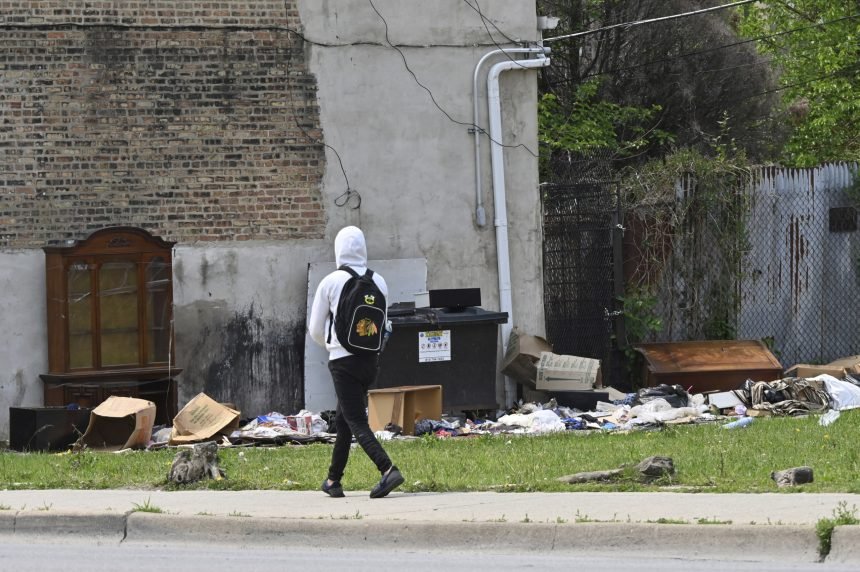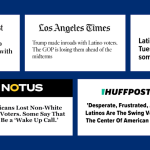Chicago Public Schools’ low-income and minority students recorded lower proficiency rates than the state average. They are also missing more school.
Most students in Chicago struggled to meet grade-level standards in reading and math last school year, but it was worse for low-income and minority students.
The recently released Illinois Report Card shows large proficiency gaps between Chicago’s low-income students and the statewide average for all students in math and reading. Black and Hispanic Chicago students also saw gaps in proficiency rates compared to the state average.
The data shows Chicago’s low-income students with achievement gaps between 19 and 22 percentage points lower than the state average. For Black and Hispanic students in CPS, gaps ranged from 15 to 28 percentage points.
But proficiency isn’t the only issue: low-income and minority students were also less engaged in school and recorded higher rates of absenteeism last school year compared to their peers.
These poor rates of proficiency come after the state artificially inflated the number of students meeting standards by lowering the scores needed to be considered “proficient” in reading and math in 2025. That means many students are now reported as “proficient” but are struggling and may not receive the support they need to succeed in school.
But there could be hope for these students if Gov. J.B. Pritzker and Illinois leaders opt into the Federal Scholarship Tax Credit program. It would allow students to receive scholarship funds to help them find a tutor, get special lessons or help with curriculum.
Low-income Chicago students record proficiency rates 19 to 22 points lower
The Illinois Report Card released Oct. 30 showed more than half of CPS students couldn’t read at grade level in 2025 and around three-quarters couldn’t perform math proficiently. But proficiency was even lower among low-income students in the city, with large proficiency gaps between low-income Chicago students and the statewide average proficiency rate.
Just 35% of 3rd- through 8th-grade students from low-income families met proficiency standards in reading and 19% in math this spring. That’s 19 percentage points lower in reading and 20 points lower in math compared to statewide proficiency rates.
There were similar demographic disparities among Chicago’s high schoolers with large proficiency gaps when compared to the average proficiency of students statewide. This spring, just 32% of low-income CPS 11th grade students met reading proficiency and 17% met math goals on the ACT. That was 20 percentage points lower than the state average for all students in reading and 22 points lower in math.
Minority students lag state average in reading and math
Black and Hispanic Chicago students also struggled to meet proficiency, especially compared to the state average. Just 34% of Black students in grades 3 through 8 scored at proficiency in reading and 16% in math. That’s an achievement gap of 19 percentage points in reading and 23 points in math compared to the state average.
Just 38% of CPS Hispanic third- through eighth-grade students scored at grade level in reading and 22% in math in 2025. That’s a gap of 15 percentage points in reading and 16 points in math compared to the state average.
Similar achievement gaps between Chicago’s minority students and the state average were prevalent among high school students. Among Chicago’s Black 11th graders, 25% were proficient on the ACT reading test and 12% in math – a difference of 26 points in reading and 28 points in math compared to the state average. For CPS Hispanic students, there was a gap of 12 points in reading and 17 points in math as 39% were proficient in reading and 22% in math.
Chronic absenteeism even worse among low-income students and minority students
Absenteeism has remained high in Chicago with 2-in-5 students missing 10% or more of the school year without an excuse. But chronic absenteeism is even worse among the city’s low-income students and minority students: 44% of low-income students, 46% of Black students and 41% of Hispanic students were chronically absent.
The high rates of absenteeism, especially among low-income and minority students, should be concerning to Chicago parents. Research shows frequent absences from school put students at a higher risk of poor outcomes, such as dropping out of school and lower academic achievement.
Federal scholarship program can help struggling Chicago students
Poor student proficiency in Chicago shows why the Federal Scholarship Tax Credit program is so important. If Pritzker opts into the program, students in public or private schools can access scholarship funds for educational services such as tutoring, additional educational classes, books or online educational materials, fees for standardized or college admission exams and fees for dual enrollment.
This means public school students in Chicago who may be struggling in certain academic areas or needing extra help or materials will be able to find the support or opportunities they need.
Illinois can provide a lifeline to struggling Illinois students. The only question is whether Pritzker and Illinois lawmakers will let Illinois students benefit.










